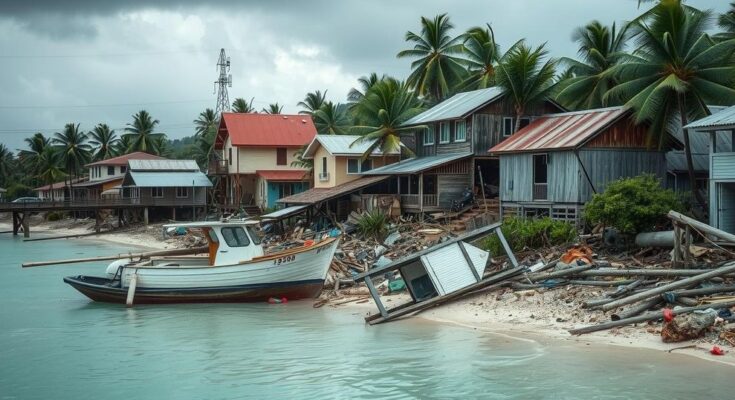Cyclone Chido has devastated Mayotte, leading to widespread destruction and a rising death toll estimated in the thousands. Emergency response efforts face challenges due to infrastructure damage, with significant shortages of food and clean water reported. The situation is dire for residents, particularly in impoverished communities, as aid begins to flow amid ongoing health and logistical challenges.
Mayotte has been severely affected by Cyclone Chido, which has been described as the worst storm in 90 years to strike the French Indian Ocean territory. With wind speeds surpassing 225 km/h (140 mph), the cyclone has caused widespread devastation, particularly in impoverished neighborhoods consisting of makeshift sheet-metal homes. “We’ve had no water for three days now,” a resident lamented, highlighting the dire living conditions in the aftermath. Although twenty fatalities have been confirmed, local officials estimate that the true death toll could reach the thousands due to the significant number of undocumented migrants among the 320,000 population.
Emergency response efforts are hindered by substantial infrastructure damage, including downed power lines and inaccessible roads. While aid supplies have begun to arrive, resources remain scarce, particularly food, water, and shelter. Approximately 85% of the territory is still without power, and nearly 20% of phone services are operational. Health concerns have escalated, with many residents reporting contaminated water supply; “The water here is completely yellow. It’s unusable for us,” remarked Amalia Mazon, a midwife at the island’s hospital.
The cyclone’s destruction has prompted a coordinated relief operation led by France, with military personnel deployed to assist in recovery efforts. French Interior Minister Bruno Retailleau indicated that it would take considerable time to fully evaluate the human toll of the disaster, emphasizing the chaotic nature of the situation.
Beyond Mayotte, Cyclone Chido also impacted Mozambique, resulting in flash flooding and structural damage, further illustrating the wide-reaching consequences of this climatic event. Experts attribute the cyclone’s intensity, heightened by climate change, to its protracted trajectory over warm ocean waters, exacerbating its destructive potential. As the cyclone weakens, it is projected to bring additional rain to regions across southern Africa, compounding the plight of affected communities.
The island of Mayotte has a complex history, initially colonized by France in 1841 and later incorporating it into the Comoros archipelago. Unlike its neighboring islands, which opted for independence, Mayotte chose to remain a French territory, resulting in a reliance on French financial support amid pervasive poverty and political instability. Approximately 75% of Mayotte’s population lives below the national poverty line, with high unemployment exacerbating the socio-economic challenges. Cyclone Chido represents a catastrophic event, compounding the struggles faced by vulnerable communities, particularly undocumented migrants, whose living conditions are precarious and often undocumented.
The aftermath of Cyclone Chido in Mayotte reveals an alarming humanitarian crisis, marked by widespread devastation, a rising death toll, and significant challenges in emergency response. The compounded effects of historical socio-economic vulnerabilities, coupled with the immediate crisis, necessitate urgent action and support to ensure survival and recovery for the affected populations. As international aid and attention focus on Mayotte, the situation underscores the critical need for ongoing monitoring and assistance, especially in the context of climate change and its implications for future natural disasters.
Original Source: www.bbc.com




